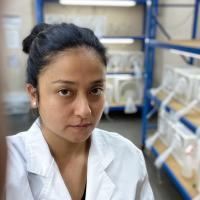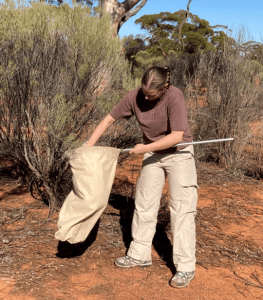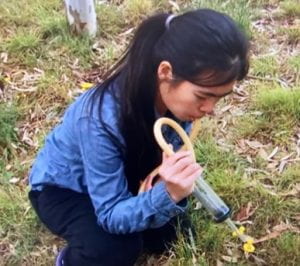Graduate, Masters and Hons Students
Avichal Tatu (PhD student, May 2023 – )
 Avichal earned his Master’s degree in India, where he studied the thermophysiology of a vulnerable desert lizard. Subsequently, he joined a lab at the Indian Institute of Science as a research assistant to work on different questions pertaining to the ecophysiology of lizards. For his PhD, Avichal is investigating the role of optical properties in the thermoregulation of Australian Jewel and Christmas beetles, co-supervised by Prof. Devi Stuart-Fox.
Avichal earned his Master’s degree in India, where he studied the thermophysiology of a vulnerable desert lizard. Subsequently, he joined a lab at the Indian Institute of Science as a research assistant to work on different questions pertaining to the ecophysiology of lizards. For his PhD, Avichal is investigating the role of optical properties in the thermoregulation of Australian Jewel and Christmas beetles, co-supervised by Prof. Devi Stuart-Fox.
Hiromi Yagui (PhD student, 2020 – )
 Hiromi started her PhD during the COVID pandemic lockdowns and couldn’t get to Australia until September 2021, when she threw herself immediately into fieldwork on her PhD topic – insect conservation. Hiromi is working with matchstick grasshoppers, including the endangered Key’s Matchstick Keyacis scurra and the Larapuna Matchstick Vandiemenella viatica. Her work involves integrating field work, captive rearing and molecular studies to understand the conservation requirements of invertebrates. She is pioneering translocation as a conservation strategy in grasshoppers. She is co-supervised by Prof. Ary Hoffmann.
Hiromi started her PhD during the COVID pandemic lockdowns and couldn’t get to Australia until September 2021, when she threw herself immediately into fieldwork on her PhD topic – insect conservation. Hiromi is working with matchstick grasshoppers, including the endangered Key’s Matchstick Keyacis scurra and the Larapuna Matchstick Vandiemenella viatica. Her work involves integrating field work, captive rearing and molecular studies to understand the conservation requirements of invertebrates. She is pioneering translocation as a conservation strategy in grasshoppers. She is co-supervised by Prof. Ary Hoffmann.
Joel Treutlein (MSc student, 2023 – )
 Joel is developing and testing ways to model microclimates that small native mammals use to escape heat stress in mallee habitats. His field work is based at Secret Rocks, where numbats and bandicoots have been reintroduced to a predator free protected area. He is co-supervised by Assoc. Prof. Katherine Moseby.
Joel is developing and testing ways to model microclimates that small native mammals use to escape heat stress in mallee habitats. His field work is based at Secret Rocks, where numbats and bandicoots have been reintroduced to a predator free protected area. He is co-supervised by Assoc. Prof. Katherine Moseby.
Kate Cooper (MSc student, 2023 – )

Kate is studying the evolution of parthenogenesis in Warramaba matchstick grasshoppers. These grasshoppers evolved parthenogenesis via hybridisation between two sexual species that occur around Kalgoorlie in Western Australia. She is recreating the crosses that produced the parthenogens in the laboratory and studying the phenotypes of the hybrids. Hopefully she will recreate a parthenogen in the lab.
Emily Xia (Ho ns student, 2023 – )
ns student, 2023 – )
Emily is studying translocated populations of the Larapuna Matchstick Vandiemenella viatica in Royal Park, Melbourne. These grasshoppers were translocated to the park in 2021 and 2022 and are persisting in many sites but not all. Emily is trying to understand why with a focus on thermal factors.